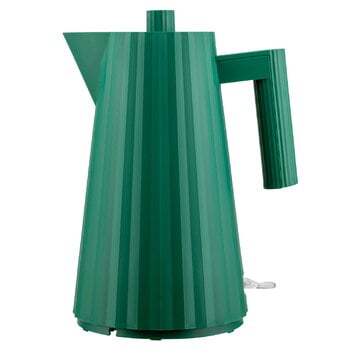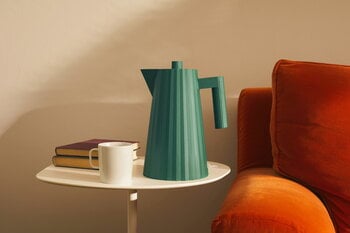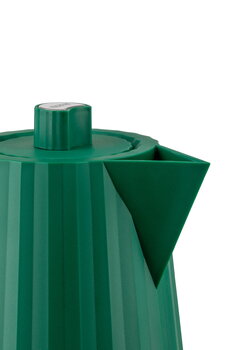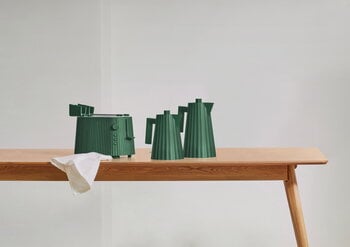The Plissé kettle by Alessi has drawn its inspiration from the worlds of fashion and architecture. Its three-dimensional surface resembles pleated fabric, and it has a dynamic, sculptural silhouette. Designed by Michele De Lucchi in 2018, Plissé is perfect for both boiling and serving hot water – thanks to the thermally insulated base, you can safely place the kettle on any tabletop. The kettle is equipped with an anti-limescale filter and a safety switch that automatically cuts off the power if there is not enough water inside. The heating element is hidden in the base for easier cleaning.
Plissé electric kettle 1,7 L, green
Alessi
Description
The Plissé kettle by Alessi has drawn its inspiration from the worlds of fashion and architecture. Its three-dimensional surface resembles pleated fabric, and it has a dynamic, sculptural silhouette. Designed by Michele De Lucchi in 2018, Plissé is perfect for both boiling and serving hot water – thanks to the thermally insulated base, you can safely place the kettle on any tabletop. The kettle is equipped with an anti-limescale filter and a safety switch that automatically cuts off the power if there is not enough water inside. The heating element is hidden in the base for easier cleaning.
Product details (11)
- Material
- Thermoplastic resin
- Colour
- Green
- Length
- 21 cm
- Width
- 16 cm
- Height
- 29 cm
- Capacity
- 1.7 l
- Wattage
- 2,400 W
- Voltage
- 220–240 V
- Plug
- UK plug (type G)
- Notes
- Separate power supply base.
- Care instructions
- To clean the inside of the kettle, we recommend using water and vinegar. For the exterior and for the power supply, it is best to use a damp cloth and a mild detergent.
- Product ID
Designer
Michele De Lucchi was born in 1951 in Ferrara, Italy. He studied architecture in Florence. After his graduation De Lucchi was a part of anti-design movement called Radical.
De Lucchi has designed lamps and furnishings for the most renewed Italian and European companies. He has received a Compasso D'oro design award together with Giancarlo Fassina for their well-known Tolomeo series of lamps.
View all productsReviews (0)
Sustainability
The Product Sustainability Framework, our criteria of sustainable design, helps you find the most sustainable products in our selection. Read below which sustainability criteria this product has met.
Working conditions & labour 8/9
-
Equal opportunities for all employees
-
Commitment to UN Global Compact, fair compensation for all employees
-
Corporate responsibility requirements defined and communicated for suppliers
-
Systematic work for improved inclusion and well-being in the workplace
-
Transparent supply chain
-
Suppliers' compliance to a code of conduct ensured
-
Direct suppliers audited and certified
-
Compliance to the UN Guiding Principles on Business and Human Rights ensured in the supply chain
-
Support for community involvement in the supply chain
Eco-friendly production 8/9
-
Fair and resource-wise water-use in production
-
No incineration or landfilling of returned items
-
No use of endangered species as materials
-
No direct environmental emissions or waste (excl. GHGs) from production
-
The sustainability of direct suppliers' production is addressed and monitored
-
Production and material sourcing that respect biodiversity, animal rights, and natural ecosystems
-
Material-efficient and ecological packaging
-
No potentially harmful chemicals used in own production
-
Positive impact on nature’s well-being through operations that regenerate natural ecosystems
Climate impact 4/8
-
Company's direct greenhouse gas emissions identified and commitment to reduction
-
Product's carbon impact identified and commitment to reduction
-
Guidance on energy- and eco-efficient use of the product
-
Carbon footprint of the product calculated and goals set to reduce it
-
Contribution to climate initiatives beyond the brand’s direct operations
-
Low-carbon or compensated transportation
-
100 % renewable energy in own production and operations
-
Carbon neutral or carbon negative product
Sustainable materials 5/6
-
Sustainable and long-lasting material choices
-
No harmful or hazardous substances
-
Responsible raw material sourcing and production
-
Materials suited for circularity: monomaterials, recyclable finishings, renewable or recycled contents etc.
-
Ecological materials: natural, biodegradable, recyclable or recycled contents
-
Outstanding materials in terms of innovativeness, responsibility, sustainability and circularity: local production or sourcing, 100 % recycled content, C2C-certification etc.
Circular design 5/5
-
High aesthetic quality promoting long-term use of the product
-
Technically durable product design and material choices
-
Design for enduring life-long quality
-
Design and support for product maintenance, repair and upgradability
-
Innovative circular design solutions: circular service system, resale platform, remanufacturing, collection of used products, etc.











